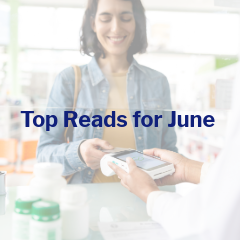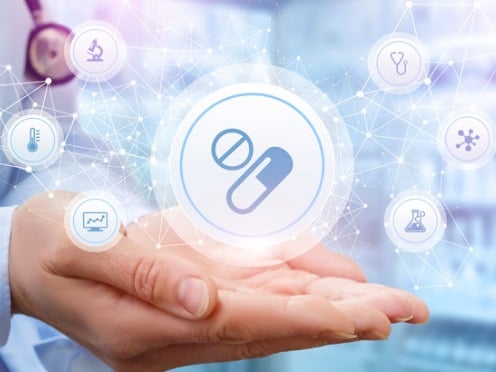
The top three Prescribed Perspectives articles downloaded by health systems in June.
A Q&A on issues health systems should be aware of from the pharmacist’s perspective.
By
Date
April 23, 2024

Read time: 4 minutes
By: Craig Dolan
 We recently sat down with Craig Dolan, Vice President of Knowledge Management and Thought Leadership at McKesson Health Systems (MHS) for another installment of our “From the Pharmacist” series, where we hear unique insights from the perspectives of industry experts who also happen to have backgrounds as health system pharmacists.
We recently sat down with Craig Dolan, Vice President of Knowledge Management and Thought Leadership at McKesson Health Systems (MHS) for another installment of our “From the Pharmacist” series, where we hear unique insights from the perspectives of industry experts who also happen to have backgrounds as health system pharmacists.
Craig’s career in pharmacy started at the bedside as a health system pharmacist, eventually working his way through management leadership and hospital administration. Currently, Craig works on the MHS Professional & Advisory Services (P&AS) team, helping hospitals and health systems operate more efficiently and making sure that business decisions better align with customers.
Find what Craig has to say about the current challenges facing health systems, what the future may hold for health system pharmacies, and which potential shifts to watch for in the coming years.
MHS: What is one of the biggest challenges members of the health system pharmacy team face today?
CD: That’s a great question, and it's actually very difficult to pick one challenge. I hear a lot about the changing environment in the way drugs are reimbursed, and how medications are procured and the rapid growth. I think one of the bigger challenges right now is what's happening with the payer mix, as patients are now assuming more of the payment for medications. One of the biggest challenges is tying reimbursements to purchases and seeing how medications are used throughout the organization, making sure that financially our health systems are made whole for the products that they are procuring.
MHS: How might the role of hospital pharmacists be different five years from now?
CD: I think the evolving role of the hospital pharmacist is looking towards more bedside care, more patient interactions, and using technology more to do the research and analysis of what's going on in patient care. I think the role has continued to evolve to be more of a health care practitioner – not in the pharmacies, in the hospitals – but actually more and more at the bedside and that it’s viewed that way by the patients and. So, I think the hospital pharmacist's role is going to continue to evolve and leverage those technologies to offload some of the manual work that's required, as well as using the knowledge that the pharmacists have to make better clinical decisions.
MHS: In your opinion, what are the top health system pharmacy developments to keep an eye on over the next few years?
CD: Automation of the pharmacy is probably one of the bigger themes. We're seeing many new technologies available to help manage the way health systems buy medications and procure medications. I think the biggest challenge across the market is related to procurement and supply assurance. Leveraging technology, AI, and different ways to predict risk in supplies and supply assurance programs I think is going to be one that we're really going to focus on. Obviously, we've invested a lot at McKesson, as our role in the End Drug Shortage Alliance and more have really put us in the forefront of trying to help our health systems evolve. So how we better partner and leverage the technology will be one of those ongoing developments I think that we'll need to keep an eye on – and how that evolves and how that partnership becomes stronger. How do we work better together to shore up the supply chain work with our manufacturer partners?
You can layer technology into all the areas of pharmacy. Maybe on the clinical side, we'll have some predictive analytics and predictive modeling tools to better pick medications for patients better and predict their outcomes on those medications. Again, I think that technology is probably one of the biggest areas to keep an eye on.
Lastly, I think we're finally getting to the point of cell and gene therapy really starting to take off, where we're going to need to be prepared as these new medications and new therapies start to hit the market. One thing to really keep an eye on is how quick will that wave grow and how big will it get – obviously with great outcomes for patients – but we need to be prepared to see how big the wave is and how fast it starts to come as these therapies get approved.
MHS: With those potential developments in mind, what advice would you give health system leaders and pharmacy leaders going into the next few years?
CD: I always say that health system leadership should continue to partner both internally and externally and make sure they're well connected. We talked a little bit about finance reimbursement, staffing, and technology. Making sure that, internally, a health system leader is well connected to those areas can help ensure that something that may happen in the health system doesn't happen without them – whether that be around AI or new tech for the organization.
The external partnerships, I think, are always important as well. As we try to stay on the cutting edge of distribution, knowing what we're working on and working with us on how we can help them do things differently, or better, or stronger would be important. Always keeping an eye on what is out there around other technologies and new, groundbreaking things that are on the way is important, too, as well as keeping an eye on the market and what's happening in that cell and gene area and these advanced medicines to stay prepared. The last thing a health system wants to do is find out there's a new therapy being launched but they don't have the programs or the services or the physicians or practice areas covered for that patient mix.
To learn more about how partnering with McKesson can help your health system achieve more for the business of pharmacy, contact us today.